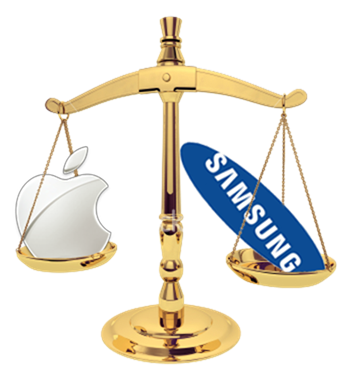The Apple versus Samsung dispute is not an isolated incident, and the continual court dates are occurring across the world as we speak. The Galaxy Tab, not really making too much of an imprint on the tablet market, has been banned from selling in numerous nations following court hearings with Apple, but in the United Kingdom, the law has decided the Galaxy Tab 7.7, Galaxy Tab 8.9 and Galaxy Tab 10.1 are not in breach of any Apple patents, and can continue retailing alongside the iPad.
Samsung spoke to Pocket Lint with regards to the hearing, and told of how the High Court of England & Wales decided the Galaxy Tab products are ‘different’ from any iPad design, thus not infringing the Cupertino company’s Registered Community Design No. 181607-0001.
In its statement, the LCD specialist did its utmost to paint Tim Cook’s company as the big bad wolf:
Samsung had requested this voluntary trial . . to oppose Apple’s ongoing efforts to reduce consumer choice and innovation in the tablet market through their excessive legal claims and arguments.
The consensus of Android affiliates seems to paint Apple as over-zealous with lawsuits it dishes out, hence Samsung imitated these proceedings in order to clear its name. Apple maintained that the Galaxy Tab series plagiarized several key iPad design features, notably ‘slightly rounded corners,’ ‘a flat transparent surface without any ornamentation,’ and ‘a thin profile.’
The fact Samsung was brave enough to get the ball rolling on this occasion would likely have worked in the company’s favor, and the High Court pointed to around 50 different examples designs patented pre-2004 which make Apple’s claims look a little bit ridiculous. Examples included the Knight Ridder (1994), the Ozolin (2004), and HP’s TC1000 (2003).
The Court also found enough differences between the devices to waive Apple’s claims, and this must go down as a major scalp for Samsung, which continued its subtle rant at Apple’s behavior:
Apple’s excessive legal claims based on such a generic design right can harm not only the industry’s innovation as a whole, but also unduly limit consumer choice.
Apple has certainly been the most forthright in its pursuit of court hearings, and although there’ve been many examples of Samsung products appearing suspectly similar to that of its Californian rival, the way in which Apple seems to feel as though it righteously owns every single aspect of a product is damaging for the market, since competing products will always have some similarities.
Thoughts?
(via PocketLint)
You can follow us on Twitter, add us to your circle on Google+ or like our Facebook page to keep yourself updated on all the latest from Microsoft, Google, Apple and the web.

